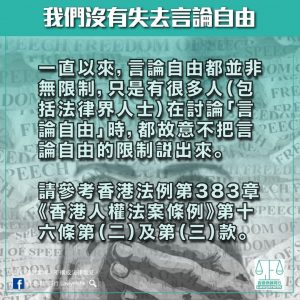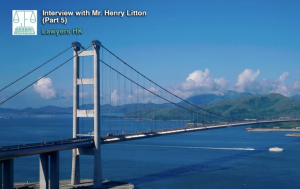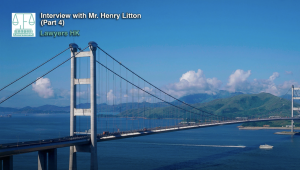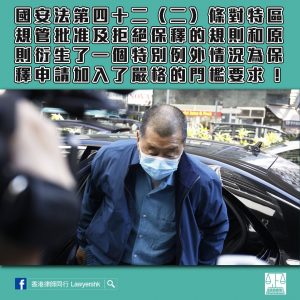我們沒有失去言論自由

我們沒有失去 言論自由
一直以來,言論自由都並非冇限制,只是有很多人(包括法律界人士)在討論「言論自由」時,都故意不把言論自由的限制説出來。
請參考香港法例第383章《香港人權法案條例》第十六條第(二)及第(三)款:
第十六條
意見和發表的自由
….
(二)人人有發表自由之權利;此種權利包括以語言、文字或出版物、藝術或自己選擇之其他方式,不分國界,尋求、接受及傳播各種消息及思想之自由。
(三)本條第(二)項所載權利之行使,附有特別責任及義務,故得予以某種限制,但此種限制以經法律規定,且為下列各項所必要者為限 ——
(甲)尊重他人權利或名譽;或
(乙)保障國家安全或公共秩序,或公共衞生或風化。
[比照《公民權利和政治權利國際公約》第十九條]
從上述可見,第(三)款明確指出可以經法律規定為保障國家安全對言論自由作出限制。
我們收到並十分贊同一名會員對有關言論自由的意見。她的英文信件如下:
We see from social media posts as well as articles from news media outlets that there is a view that ‘free speech is dead in Hong Kong’ or that certain language is ‘criminalised’ as a result of a press release from the HKSAR government concerning the implication of the slogan ‘liberate Hong Kong; revolution of our times’. To be very precise with the use of language, the press release stated that this slogan has connotations of “Hong Kong independence, separating HKSAR from PRC, altering the legal status of the HKSAR, or subverting State power”. The press release goes on to state that the Government strongly condemns any acts which challenge the sovereignty, unification and territorial integrity of the PRC (which, we would like to point out, is something that the Basic Law requires the HKSAR Government to uphold). The press release then goes on to state that the national security legislation (NSL) prohibits secession, subversion of state power and other acts and activities which endanger national security (which, is basically a repeat of what the NSL is designed to do). And then asks the public to not defy the law.
Just in terms of logic and basic interpretation, the view that freedom of speech is somehow extinguished is like saying chillies are generally spicy (slogan has connotations of HK independence etc), eating spicy food gives you an upset stomach (NSL prohibits acts of secession etc), therefore eating chillies gives you an upset stomach (slogan = breach of law). Patently that would be incorrect because eating one chillie might not give you an upset stomach, but eating a ton definitely would. In the same way, whether an action would invite sanction under a particular piece of law is still ultimately dependent on the facts and what the law states. Jumping to conclusions is lazy and intellectually dishonest. We urge those who are in the position to influence to desist from such underhanded sleight of hand.
So what exactly are the protections for free speech in Hong Kong? Let’s turn to Cap 383 Hong Kong Bill of Rights Ordinance, Art 16. This states that everyone shall have the right to hold opinions without interference. Everyone shall have the right to freedom of expression… to seek, receive and impart information and ideas of all kinds, regardless of frontiers, either orally, in writing or in print, in the form of art, or through any other media of his choice. Art 16 continues to state that such rights are subject to certain restrictions: rights or reputations of others (think defamation) or for the protection of national security or of public order or of public health or morals. So in Hong Kong, the freedom of speech is not unlimited, and is (rightly, in our view) restricted for certain specific reasons. The HKSAR Government, by virtue of stating their view on the meaning of the ‘liberate Hong Kong’ slogan, is merely explaining that there is a risk that the usage of these words could cause an offence under the NSL. Offences under the NSL would rightly fall within the exception within the Bill of Rights Ordinance. Please also note that the wording in Art 16 is the same as the wording in Art 19 of the International Covenant on Civil and Political Rights.
So what’s the law like in other places? As a general matter, freedom of speech is not unlimited in other jurisdictions. USA probably has one of the strongest protections of free speech in the world (first amendment rights), and whether this is a good or bad thing is highly dependent on whether you are on the receiving end of hate speech. Suffice to say that being able to wander around and shout that ku klux klan is the coolest thing in the universe is definitely very strong free speech protection. But if you have historic reasons to fear the kkk (or you were in charlottesville and observed the power of hate speech), then the pleasure of being able to hear this type of slogan chanting is probably not up there in the priority list of reasons why freedom of speech must be unlimited. But even in the US, there is a very narrow situation when freedom of speech is subject to limitations, and that is in certain cases of treason. Clearly, treasonous activities would understandably not be shielded in an unlimited way by free speech protection. In liberal Europe, freedom of speech has more restrictions. In Germany, for example, Nazi symbols and slogans are criminalised. Full stop. No argument. For the rest of EU, there are regulations against hate speech, which limits the right of people to spew language regarding racism, xenophobia, anti-Semitism, intolerance and discrimination. The point is that whether freedom of speech can be, should be, must be unlimited, and whether certain language is justifiably within the limits of the types of speech that is harmful to society and should be curtailed, is a very difficult question. This would likely result in a broad spectrum of views driven by history, cultural expectation and personal history and experience. A bald statement that ‘free speech is dead’ is lacking in nuance in a world which isn’t just black and white and simply inflammatory. Again, Hong Kong needs some calm thinking and cooler heads. Let’s all learn to be a bit more intellectually demanding.







